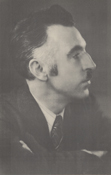 This Goodly Land
This Goodly Land
Clement Wood (September 1, 1888–October 26, 1950)

Other Names Used
- Clement Richardson Wood: full name
- Alan Dubois: pen name
Alabama Connections
- Tuscaloosa, Tuscaloosa County: birthplace, education
- Birmingham, Jefferson County: childhood residence, adult residence
Selected Works
- Wood, Clement. Glad of Earth. New York: L. J. Gomme, 1917. An online version of Glad of Earth is available from Google Book Search.
- Wood, Clement. Mountain: A Novel. New York: E. P. Dutton & Company, 1920. An online version of Mountain is available from Google Book Search.
- Wood, Clement. Poets of America. New York: E. P. Dutton & Co., 1925.
- Wood, Clement. The Outline of Man's Knowledge: The Story of History, Science, Literature, Art, Religion, Philosophy. Illus. Louis Bromberg and Ilonka Karasz. New York: Lewis Copeland Company, 1927.
- Wood, Clement. The Complete Rhyming Dictionary and Poet's Craft Book. Garden City, N.Y.: Doubleday, 1936.
- Wood, Clement, and Gloria Goddard. The Complete Book of Games. New York: Halcyon House, 1938.
- Wood, Clement. The Glory Road, and the Eagle Sonnets. New York: Greenberg, 1950.
Biographical Information
Clement Wood was born in Tuscaloosa, Ala., and grew up in Birmingham. His father was a lawyer, his mother was a concert elocutionist, and his maternal grandfather was a poet. Wood began writing poems as a child. He graduated with an AB degree from the University of Alabama in 1909, where he was the editor of the yearbook, The Corolla. Wood attended law school at Yale University, obtaining an LLB in 1911. While at Yale, he was the assistant editor of the Yale Law Journal. From 1911 to 1912, Wood practiced law in Birmingham. He was made a judge in 1913 but was soon removed from the bench after running afoul of the political establishment. After an unsuccessful run for city office, Wood moved to New York, where he worked briefly as secretary to novelist Upton Sinclair. From 1914 to 1922, Wood supported himself by working as a teacher while establishing his credentials as a poet.
In 1917, Wood won the Newark [N.J.] 250th Anniversary Prize with his poem, “The Smithy of God.” That same year, his first book of poetry, Glad of Earth, was published. In 1920, Wood’s poem, “Jehovah,” won a prize from the Lyric Society. In the following years, Wood worked at a variety of jobs and wrote prolifically in a wide array of genres, although much of his work was not well received by critics. Wood spent two years as a lecturer on the White Star line of ships. He taught correspondence courses, sang spirituals in concerts and on the radio, and wrote approximately seventy Little Blue Book pamphlets, a series aimed at the American working class. Wood was a Socialist and lectured for the Ingersoll Forum of the American Society for the Advancement of Atheism. He was highly opinionated and seemed to seek out controversy. Wood was a poet of the Romantic school and criticized the newer trend of Realism in poetry. He was active in New York literary society, however, especially the Poetry Society of America. At the age of sixty-two, Wood suffered a stroke at his home in Delansen, N.Y., and died in a hospital in Schenectady.
Interests and Themes
Clement Wood was primarily a poet, but he also wrote novels, murder mysteries, spy stories, literary criticism, biography, history, reference works for beginning poets, and books about games. Some of his best known poems are written in black dialect.
For More Information
Please check your local library for these materials. If items are not available locally, your librarian can help you borrow them through the InterLibrary Loan program. Your librarian can also help you find other information about this author.
There may be more information available through the databases in the Alabama Virtual Library. If you are an Alabama citizen, AVL can be used at your public library or school library media center. You can also get a username and password from your librarian to use AVL at home.
Photo from The Glory Road, 1936.
Last updated on May 30, 2008.